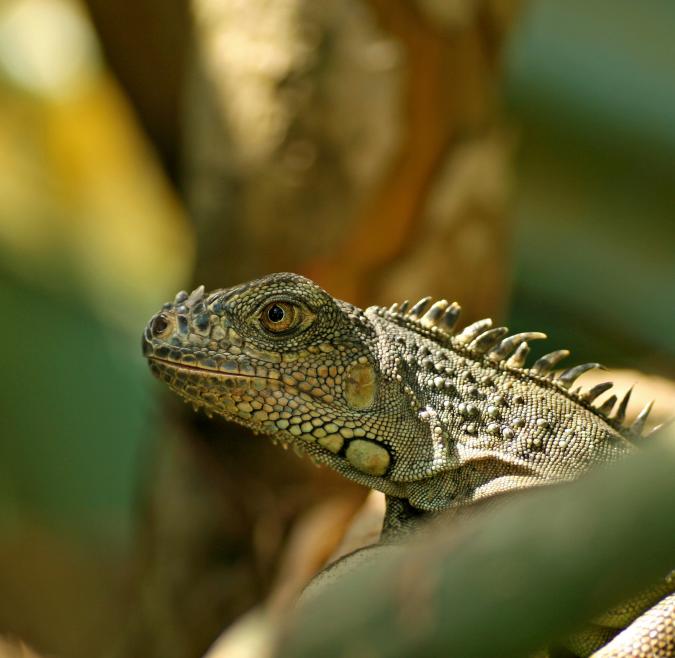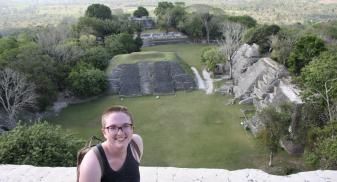Summer: CELA (Belize)
The Program
Travel to San Ignacio, Belize to study Large Animal Veterinary, Marine Ecology and Wildlife Health - or a combination of offerings through CELA's hands-on courses.
Large Animal Veterinary Practice in the Tropics - This course is designed for the veterinary, pre-veterinary, animal science or zoology students to gain working knowledge of the husbandry, and health issues confronting farm animals including horses, sheep, pigs, and cattle in Belize.
Wildlife Health, Ecology & Conservation - Get a behind-the-scenes look working with zookeepers at the Belize Zoo, learning a variety of field learning methods on wild and captive animals. Through a combination of classroom lectures, field trips and practicums, students will learn about the many factors that affect the management, conservation, habitat and health of wild animals.
Tropical Marine Ecology and Conservation - Learn the key biotic and abiotic components of a coral reef system and how they interact. Explore the current state of the Belize Barrier Reef through classroom, field and laboratory components, including snorkeling.
Program Location

Belize
San Ignacio
San Ignacio is the second largest city in Belize (after Belize City), and is the home of the Center for Engaged Learning Abroad (CELA). The city got its start as a mahogany-producing center under British colonial rule, but has since branched out to other fields, including ecotourism. Students will use San Ignacio as their launching point for learning about local issues related to conservation, animal health, ecology, and more, as well as the impact these issues have on global events
Academics
Rutgers University has partnered with CELA Belize to offer three programs for students interested in traveling abroad to Belize during the summer:
Large Animal Veterinary Practice in the Tropics | Summer II (Section B), Summer III (Section C)
Update: Large Animal Veterinary Practice Summer I (Section A) is closed at the course is now fully enrolled.
This course is designed for the veterinary, pre-veterinary, animal science or zoology students to gain working knowledge of husbandry, and health issues confronting farm animals including horses, sheep, pigs, and cattle in Belize. Students get the opportunity to learn hands-on veterinary examination techniques at working ranches and farms as well as learn about animal agriculture in Belize, including analyzing laboratory specimens in a laboratory. Lectures focus on the selection, nutrition, reproduction and management of horses, beef cattle, goats, swine and sheep. Other topics taught in this course include animal anatomy and physiology, animal agriculture economy, animal diseases and animal research. Students participate in a local animal health clinic, practicing their new skills and assisting in spay and neuter procedures.
For more information, including a course syllabus, please click here.
Wildlife Health, Ecology and Conservation | Summer II (Section B)
Students will work alongside zookeepers in the world renowned Belize Zoo. The focus of the course is on wildlife veterinary practices, conservation and research methods. Species specific focus will include the research and conservation of the Jaguars, Tapirs, Howler and Spider Monkeys, Crocodiles, and various Raptor species. Students will gain insight on several field research techniques including specialized traps, GPS and VHF tracking, camera trapping, chemical immobilization and remote drug delivery, avian mist netting, bird banding, and nest searching and monitoring. Students will also get the opportunity to observe and collect data on captive and wild animals.
Program Location (La Democracia Village / Belize Zoo, Belize): Students will be based at the Tropical Education Center (TEC), located at Mile 29 on the George Price Highway, across the road from the Belize Zoo. There they will have the opportunity to work alongside zookeepers in the world-renowned Belize Zoo. The central focus of the course is on wildlife conservation and research methods. The course will travel to Runaway Creek Nature Reserve to experience field research conditions. Students will have the opportunity to observe and collect data on both captive and wild animals in wetland savannahs and the tropical rainforest environments. The course will learn about current wildlife research in Belize, conservation challenges, as well as rehabilitation and education efforts.
For more information, including a course syllabus, please click here.
Tropical Marine Ecology and Conservation | Summer III (Section C)
The focus of this course is to learn the key biotic and abiotic components of a coral reef system and how they interact. Students will come to understand the worldwide importance of coral reefs as well as their “canary in a coal mine” status. The course explores the current state of the Belize Barrier Reef east of Ambergris Caye and south to Caye Caulker. The biological and ecological history of this reef system will be used to inform attempts to predict its future under varied management strategies. Our local findings will be theoretically applied to all coral reef systems. We will also explore anthropogenic activities that have positive and negative impacts on these ecosystems in general. Lectures will encompass uninformed human activities locally and globally that can be addressed to achieve a more positive outcome for coral reefs.
Program Location (San Pedro, Ambergris Caye): Ambergris Caye was named by the pirates who frequented the island in the early 17th century and were said to be whalers who collected the ambergris (whale excrement) that washed up on the shores of the island. San Pedro, the main village on the island, was founded in 1848 by four families of Mestizo refugees who fled an insurgency in the Yucatan Peninsula. These settlers had been farmers and fishermen and provided food to the British landowners harvesting lumber in the area. This 25 mile- long island rests alongside the second largest barrier reef in the world- The Belize Barrier Reef, making it an ideal location for students to study marine ecology and conservation.
For more information, including a course syllabus, please click here.
Students will register for one three-credit course per section at CELA. Students can take one section for three credits, or two back-to-back sections for a total of six credits.
Courses listed above have been approved as Rutgers credits, meaning that if you take these courses, the price listed below will appear on your term bill and the credits will transfer back as Rutgers credits. If you wish to apply to a course offered by CELA that does not appear above, you will be responsible for paying CELA directly for the appropriate amount and working through your department to receive transfer credit. Please contact the Program Advisor (listed at the top of this page) if you have any questions.
For information about study abroad credit transfer, registration, and transcripts please visit the Academic Planning tab on our website, located in the students section. You can also visit the Course Equivalency Database, as well as Course Equivalency Guidelines.
School of Environmental and Biological Sciences (SEBS) course equivalencies:
- Large Animal Veterinary: Approved for Animal Science Study Abroad Experience Based Education Equivalent (Pass/No Credit)
Wildlife Health: Approved for Animal Science Study Abroad Experience Based Education Equivalent(Pass/No Credit)
Marine Ecology: Approved for Environmental Science Elective OR Study Abroad Experience Based Education Equivalent; Approved for Marine Science Study Abroad Experience Based Education Equivalent (traditional grading scale)
Housing and Meals
-
Tropical Marine Ecology - all meals
-
Wildlife Health, Ecology and Conservation - includes breakfast and dinner each day
-
Large Animal Veterinary Practice in the Tropics - breakfast only
Large Animal Veterinary Practice in the Tropics
Accommodation for this course is hotel style with access to swimming. Students share comfortable rooms, hot and cold water, and wifi. Convenient stores and the town center are easily accessible. Breakfast is included on this course. Students will have the opportunity to try Belizean cuisine for lunch and dinner daily on their own (with daily suggestions from staff).
Wildlife Health and Conservation
Program housing is simple, rustic-style housing with shared rooms, mosquito nets or screened windows, hot and cold showers, and shared bathrooms. You will share rooms with other CELA students by gender. Wifi is available in common areas, and there is a workspace, dining area, and small library area on site. You will have staff on-site 24/7. Meals at the TEC are buffet-style with a wide selection of Belizean, American, and Central American dishes. Breakfast and dinner are included on this course.
Tropical Marine Ecology and Conservation
Housing: The Tropical Research Education Center (TREC) is located a short ride out of San Pedro town, where students stay in dorm/cabana style housing on the research station. All cabanas are set up around a pool where students practice their snorkeling skills before heading out to sea. Meals at TREC are buffet-style with a wide selection of Belizean, American, and Central American dishes. All meals are included for this course. Lectures take place in the classroom at the research station. There is a full library and museum on site. Students take a daily 5 minute walk to the Goliath II (private yacht with kitchen and bathroom on which they spend 6-8 hours per day) which then docks at the TREC at the end of the day. Once back at TREC – internet only works in the communal areas and not in the dorms. This course explores a portion of the world’s second largest barrier reef and its surrounding habitats, and protected areas, which means students are snorkeling or in the water upwards of 5 hours per day, along with class room time on other days.
Food in Belize:
Belizean cuisine consists of both local and imported dishes. Over the course of your stay in Belize you will be able to try traditional Belizean meals, Mexican dishes, Central American inspired dishes, Caribbean, American and some European cuisines. For instance, breakfast might consist of a Belizean Fried Jack (a fried dough) with eggs, beans and fruits or vegetables. Lunch might be salbutes and a natural fruit juice, and dinner served up as the famed Belizean Rice and Beans. The food is great, so feel free to indulge in all the different tastes.
Financial Information
Program Costs
| NJ Resident | non-NJ Resident | |
|---|---|---|
| Program Cost | $4,210 | $4,555 |
Program Cost includes:
- Tuition
- Housing
- Some or most meals (see above)
- 24/7 In country support
- Administrative Fees
- Emergency Medical Access Abroad
Out-of-Pocket Costs
| Airfare | $700 |
| Meals | $100 |
| Books and Classroom Materials | $50 |
| Local Transportation | $25 |
| Personal Expenses | $100 |
| Total | $975.00 |
Out-of-Pocket Cost includes:
The above costs are estimations and represent the known out-of-pocket costs students encounter during their time abroad.
Some of these expenses will be paid for prior to going abroad, such as an airline ticket, while some of these expenses, such as meals and personal expenses, will be paid in-country as part of your daily expenses. As you plan, you will need to budget these costs and spend wisely throughout your time abroad.
Program Costs
| NJ Resident | non-NJ Resident | |
|---|---|---|
| Program Cost | $7,040 | $7,730 |
Program Cost includes:
- Tuition
- Housing
- Some meals
- 24/7 In Country Support
- Administrative Fees
- Emergency Medical Access Abroad
Out-of-Pocket Costs
| Airfare | $700 |
| Meals | $200 |
| Books and Classroom Materials | $100 |
| Local Transportation | $50 |
| Personal Expenses | $200 |
| Total | $1,250.00 |
Out-of-Pocket Cost includes:
The above costs are estimations and represent the known out-of-pocket costs students encounter during their time abroad.
Some of these expenses will be paid for prior to going abroad, such as an airline ticket, while some of these expenses, such as meals and personal expenses, will be paid in-country as part of your daily expenses. As you plan, you will need to budget these costs and spend wisely throughout your time abroad.

